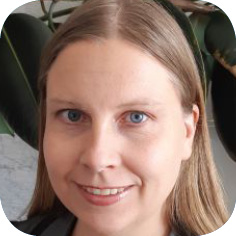It all started 25 years ago when Mr. Heikki Kokkala, a senior education specialist from Finland, and the late Mr. Khalil Mahshi, then director general of external relations at the Ministry of Education in Palestine, met at a UNESCO conference on education. This was a time when educationists globally had started to pay more attention to the effectiveness of education systems and to the assessment of learning outcomes.
In Palestine, work had already started on developing the first-ever unified national curriculum which would replace the Jordanian and Egyptian curricula used in the West Bank and Gaza, respectively. Mr. Kokkala and Mr. Mahshi noted the need to also initiate an assessment and evaluation system for Palestine to provide information about the students’ learning results which would help the authorities to develop the instructional materials used in schools. At the same time, the Finnish government was looking for ways to support the newly established Palestinian Authority and decided to direct its support to the education sector.
Thus, Mr. Kokkala and Mr. Mahshi, with their many colleagues, began to design the first cooperation project between Finland and Palestine. This, however, was easier said than done. Mr. Kokkala recalls that the members of his team were among the few foreigners who would visit Ramallah back then. Given that vehicles were forbidden from crossing the checkpoints, the team had to cross by foot but were not always granted access.
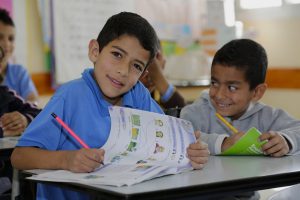
In April 1996, a Finnish educational expert, Ms. Raisa Venäläinen, arrived in Ramallah to support the implementation of the first bilateral cooperation program, PALFEP – the Palestinian Finnish Education Programme. She worked with the Ministry of Education to help with the establishment of an educational assessment and evaluation center in Ramallah and the establishment of an instructional media center to produce locally available teaching and learning materials. This project also supported the development of administration systems in education. One of Ms. Venäläinen’s close colleagues at that time was the newly appointed director of the assessment and evaluation center, Dr. Basri Saleh, who currently holds the position of deputy minister in the Ministry of Education and Higher Education.
Sometimes Ms. Venäläinen’s support was very hands-on: She was able to drive to Gaza with her embassy-registered Fiat Panda, and she recalls the many times the boot of her Fiat was full of canvas bags with documents to be delivered between the ministry offices in Ramallah and Gaza. Many years later, when her daughter asked Ms. Venäläinen what she actually had been doing all those years in Palestine, she concluded: “I was just being myself, and we all worked 24/7.”
Ms. Venäläinen describes her first years with the project as the Palestinian honeymoon, a time when her Palestinian counterparts had great hope, determination, and enthusiasm to build an education system that would fulfil the needs and aspirations of a Palestinian nation. From the beginning they aimed high: to provide Palestinian children with equal opportunities for the highest quality of learning.
Ms. Venäläinen recalls that the first education-sector working-group meeting was organized in 1999, gathering a handful of partners who were implementing education projects in Palestine together with the Ministry of Education. The meeting was the start of a process that would eventually lead to the development of the Palestinian education development strategic plans and coordinated partner support for sector-wide development.
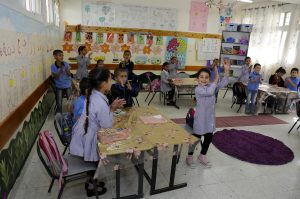
Over the years, through harder and better times, Finland has been a staunch supporter of education in Palestine, supporting system-wide reforms to enhance educational quality and equality. Projects were never discontinued, although there were periods when activities slowed down, such as during the second Intifada. Finland’s bilateral projects culminated in the setting up of a multi-donor Joint Financing Arrangement in 2010, which to date is a solid partnership of several European countries and the Ministry of Education, to provide financing for the education sector.
The results of this partnership illustrate its success: for example, 114 schools in Gaza that were damaged by the 2014 war have been rehabilitated, and some of the most vulnerable students in Area C are provided with safe access to schools through school transport. Thousands of teachers have benefitted from professional development activities that are offered to strengthen their pedagogical skills and to support them in assuming more learner-centered teaching methods. Major policy reforms that expand the provision of public preschool education and create a vocational secondary path qualifying for the new Injaaz examination, which replaces the Tawjihi, have been adopted and stipulated in new education legislation.
But there is still work to be done. In addition, the future generations of Palestinians need to be educated. Their right to education must be preserved, promoted, and protected. The quality of their education and equal opportunities for all must be further enhanced. Therefore, Finland, together with its many international partners, is determined to continue its support of the public education system as well as the UNRWA schools.
Working in cooperation with its international partners, Finland has supported the Palestinian Ministry of Education in numerous projects and is committed to continuing its support of the public education system and UNRWA schools in Palestine.
Visiting schools in Palestine is always an uplifting and encouraging experience: teachers demonstrate remarkable determination and resilience as they work in difficult conditions against all odds and often with limited resources in order to provide a rewarding educational experience for their students. Students talk about their dreams of becoming teachers, doctors, pilots, and engineers. Boys and girls share their hopes of living in peace and enjoying equal rights with children all over the world.
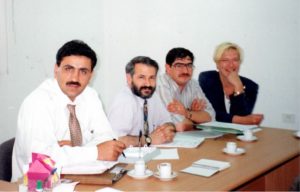
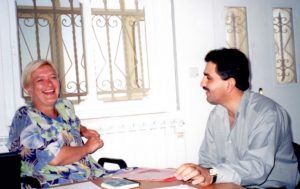
No wonder that the Minister of Education and Higher Education, Dr. Sabri Saidam, often talks about his ministry as the Ministry of Hope. It is truly that.

